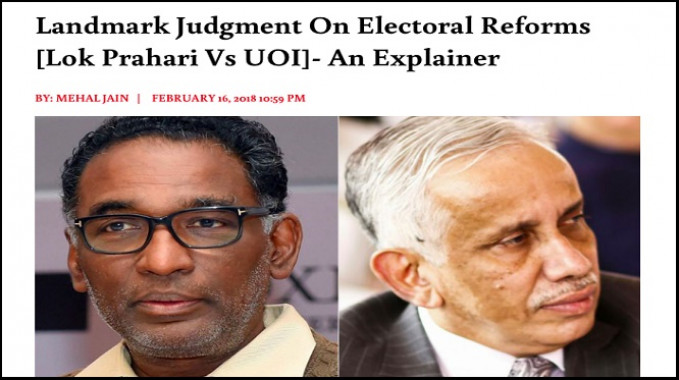The right to privacy vs the right to know
In a recent judgment in the case of Lok Prahari v. Union of India, a bench of Justice Chelameshwar and Justice Nazeer of the Supreme Court have expanded the voter’s fundamental right to know to include not just the assets of the candidates standing for election but also the source of their income.
This obligation extends not only to the candidates but also their spouses and dependents. The court arrived at this conclusion by expanding on its earlier judgment in Union of India v. Association for Democratic Reforms & Another (2002) 5 SCC 294 where it held that every voter had a fundamental right to know, under Article 19(1)(a), the assets and qualifications of candidates because it was only on receipt of such information that they could express themselves by exercising their vote for the best candidate.
The present judgment does not stop with requiring this extra level of disclosure. The judges go on to hold that the non-disclosure of information would be considered as a corrupt practice under the heading “undue influence” in Section 123(2) of the Representation of People Act thereby opening the door to disqualification of the candidate.
While this judgment is bound to have political repercussions, I am stumped by the manner in which this court has completely ignored the privacy dimension. The bureaucracy has for long been raising the privacy flag every time it has been asked to disclose it assets. A few years ago, when a Parliamentary Committee was looking into the issue, it agreed with a government recommendation that bureaucrats should only disclose their assets to the ‘competent authority’ rather than disclose them publicly.
The ‘competent authority’ could then disclose these details to the Lokpal who would be required to keep the information confidential. The entire thread of argument underlying this issue was that of the bureaucrat’s privacy. This discussion happened in 2015, more than six years after the Central Information Commission held that bureaucrats could not hide their assets on the grounds of privacy. It appears that this order has not yet been implemented.
Similarly, judges of the higher judiciary have been resisting the Full Court’s resolution from 1997 to make public all their assets. As of October, 2017 the media was reporting that nearly half of the 25 judges on the Supreme Court had not made publicly available their assets. I suspect most of them will claim that such disclosure violates their fundamental right to privacy.
As documented earlier in the Hoot, Indian judges have never shied away from invoking their privacy right when faced with RTI applications. Even in the judgment where the Supreme Court struck down the National Judicial Appointment Commission (NJAC), one of the judges strongly protested against the government’s proposal to make the proceedings of the NJAC completely transparent on the grounds that it “does not take into account the privacy of a person who has been recommended for appointment, particularly as a Judge of the High Court or in the first instance as a Judge of the Supreme Court. The right to know is not a fundamental right but at best it is an implicit fundamental right and it is hedged in with the implicit fundamental right to privacy that all people enjoy.”
So, if privacy has always been a concern for bureaucrats and judges, why is it that the Supreme Court did not even think it fit to discuss the issue in the context of legislators, especially when nine judges of the court recently concluded that all Indians have a fundamental right to privacy?
It is important to discuss this issue because privacy has a dangerous dimension to it, in that it abridges other rights like the right to speech and the right to know under Article 19(1)(a). Of what use is this fundamental right if it can be abridged by the court in order to favour the fundamental right to know of the voter under Article 19(1)(a)? Can courts favour one set of fundamental rights over another? If so, what is the basis of making such a judgment?
Are we to understand that fundamental rights are status driven, in that citizens who are running for public office automatically lose their fundamental right to privacy? The rationale for fundamental rights is that they are so sacrosanct that they cannot be sacrificed or abridged by the state. They may be subject to reasonable restrictions but the restriction cannot eviscerate the very nature of the right.
More importantly, what of the fundamental right of the spouse or the dependent? How can they be stripped of their fundamental right merely because a blood relative, who is an autonomous individual, has taken a decision to stand for public office? Of what use is a fundamental right that is contingent on the behavior of another individual?
The dominating theme of the Puttaswamy judgment was that the individual was at the centre of the constitution. Yet, in a judgment delivered less than a year after Puttaswamy, the court did not even think it necessary to pay even lip service to these issues. So much for the fundamental right to privacy!







